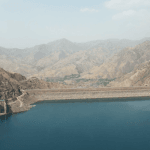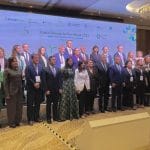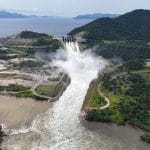As Nord Stream-2 builders are planning to finish the gas pipeline from Russia to Germany underneath the Baltic Sea by the end of the year, the European Commission wants Moscow to provide guarantees of keeping the Ukrainian gas transit after the contract expires in December 2019.
On 13 June, European Commission Vice-President for Energy Union Maroš Šefčovič visited Moscow where he held a bilateral meeting with Russian Minister of Energy Alexander Novak, discussing strategic energy-related issues, including Trilateral Gas Talks on the long-term continuation of gas flows to the EU via Ukraine and the synchronisation of the Baltic States’ electricity systems with continental Europe.
Šefčovič said he appreciated the constructive approach. He wrote in a tweet that Novak confirmed that Russia is ready for Trilateral Gas Talks and the next round will be held in September. “After my consultations with Ukraine I’m set to convene them. Time is of the essence,” he wrote, reminding that the contract between Russian gas monopoly Gazprom and National Joint Stock Company Naftogaz of Ukraine expires at the end of 2019, which is “round the corner.”
Naftogaz welcomed efforts of Šefčovič to arrange the next meeting between Ukraine, the EU and Russia to discuss gas transit after 2019 but was disappointed that there would be no meeting in June, July or August. “The Russian side will be ready to discuss the date of the next meeting no earlier than in September,” Naftogaz wrote in a tweet on 14 June.
TASS quoted Novak as saying on 13 June that Russia is ready to extend the gas transit contract with Ukraine under current conditions. “Russia takes a constructive position on this issue and is ready to continue gas transit through Ukraine and ensure supplies to European consumers. We are ready to extend the contract under current conditions,” Novak was quoted as saying.
The US and some European states, including Poland and the Baltic States, have vehemently opposed the controversial Nord Stream-2 pipeline that will bypass Ukraine, supplying Russian gas directly to Germany. According to European Commission estimates, Ukrainian budget receives up to €3 billion from the gas transit.
Meanwhile, a former German ambassador, who has extensive experience in Russia and the region, reminded that Nord Stream-2 is going to operate by the end of the year. “It’s already in a pre-final stage and it’s going to be begin operations I think in December,” he told New Europe on 11 June, speaking on condition of anonymity as he is retired and no longer involved in German Foreign Policy.
“At this stage, it would be a major issue everywhere to take it off when you already laid the pipes and it’s almost finished. I think there is much hypocrisy in the whole matter. I mean it’s not only Germany that has an interest, it’s also France, Holland, Austria, Czech Republic – they all have their interests. I mean major criticism is focused on Germany and it’s not fair,” the German diplomat added.
He questioned, however, whether Nord Stream-2 will be used in full capacity or not. “The Americans are also pressing. They want to sell their liquid gas. As I said, a lot of hypocrisy; there are vested interests everywhere and in the end I think you will find that it’s in the interest of Europe, from my feeling, because it diversifies our sources of energy and nobody can say that it makes Germany more dependent,” the former German ambassador argued.
According to the German diplomat, keeping the Ukrainian gas transit after the contract expires in December 2019 is certainly a major issue. He reminded that German Counselor Angela Merkel “has made a point of that” and promised the Ukrainians, “She would take it up with the Russians in a way that Russia would let a lot of the supply go through Ukraine. Let’s see if they really keep their word.”
The former German ambassador highlighted the good relations between Berlin and Moscow but stressed that “we also have problems with them,” namely Russia’s annexation of Crimea and Moscow’s involvement in eastern Ukraine. He argued that that even if Nord Stream-2 and the second branch of Turkish Stream to Europe are completed, some volumes of Russian gas could still be transited via Ukraine because it would “make sense economically.”
follow on twitter @energyinsider







